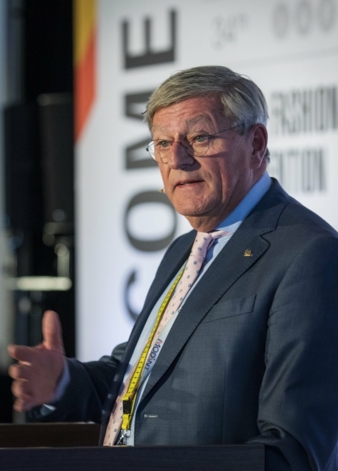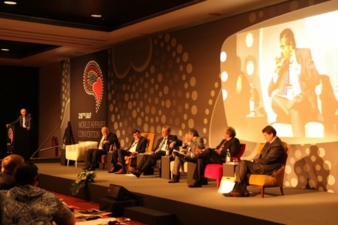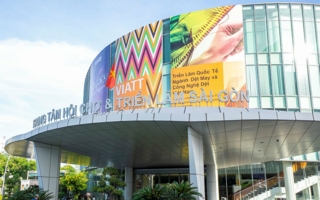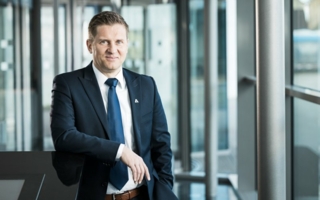11/10/2021 – Four questions to Han Bekke — auf Deutsch lesen
“Apparel supply chain needs re-set…”
Our dialogue partner is an excellent listener, always open-minded in the true sense of the word: reflection included. And so Han Bekke did not hesitate for a second to answer the burning questions raised by textile network correspondent Yvonne Heinen-Foudeh. During the interview, the reigning IAF president was on a trip to Italy, commented on his position in Rome, the eternal city.
textile network: We live in a period of uncertainties – the consumer market has been shaken like never before, the global supply chain has never seemed so unstable. From your perspective, what share of the fashion industry’s current challenges originated with the pandemic, and what percentage were pre-existing problems that the industry now had to confront quickly?
Han Bekke: Difficult to put this in percentages, but for me it is clear that Covid-19 caused a crisis that was unprecedented and that still has great impact on our economy and society. Also, our textile-apparel supply chain was highly affected and is slightly recovering since the pandemic is still not beaten with new variations like the Delta-one. Health and safety are rightly top priorities, but on the other hand economy should come back to live.
My other observation is that before Covid-19 our sector was already suffering, hardly healed from the earlier financial crisis from 2008 onwards. It was already clear that our supply chain needed a re-set, something that is now accelerated by the crisis we are trying to get out. In my view the buyer-supplier relationship should be re-balanced. We should create a pull market rather than keeping the push market we are in now with heavy pressure on prices. We should investigate changes in the order rhythm, re-consider our sourcing strategies, consider how smart factories could improve productivity and cost-competitiveness, develop an omni-channel distribution plan including e-commerce based on data and finally increase our contribution to a cleaner and more sustainable planet. Speed to market is key but it should go along with shared risk and value among players in the supply chain. On our way to achieve all this, we need more collaboration in our supply chain, more than ever.
textile network: The guiding principle of ecological, economic and social sustainability increasingly determines policy – nationally, certainly at EU level with the “Green Deal” in place and globally. Necessary developments that also and above all affect apparel. The processes of adapting entrepreneurial action to the needs of the planet – of the people who produce fashion and of those who consume it – are complex and demanding. Transparency, traceability and cooperation along the global supply chain are key demands and require implementation of effective technology tools on the way to a sustainable development. In this most demanding scenario where does the International Apparel Federation, where does IAF see its roles and tasks now and in the future?
Han Bekke: For many years IAF has persuaded its membership of national apparel and textile organisations to inform their member companies of the growing pressure on our supply chain to become more sustainable and less polluting. Pressure comes from ngo’s, public opinion, but recently also from governments preparing and implementing laws i.e on traceability and circularity and/or combining both with trade arrangements.
Transparency has become a huge issue. Tier 1 suppliers will face pressure, but also are presented opportunities, to play an important role in acquiring more transparency upstream for their clients. Alongside the physical and financial stream in the supply chain the data stream will be key.
The industry must accelerate its efforts to increase the transparency of its supply chains. There must be an extensive and trustworthy back and forth flow of information alongside the flows of physical goods and money. IAF will focus its efforts on strengthening the collaboration on a global level between the apparel and textiles industries and to bring best practices together.
The essence to the greening of the industry is a supply chain wide, collaborative approach. Pledges to reduce CO2 emissions are important but not sufficient.
The questions on behalf of textile network were asked by Yvonne Heinen-Foudeh.
Read the entire interview in English in our print issue 5/2021. Click here to subscribe





